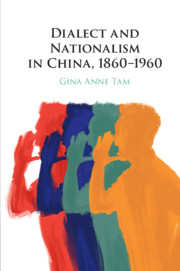Book contents
- Dialect and Nationalism in China, 1860–1960
- Dialect and Nationalism in China, 1860–1960
- Copyright page
- Dedication
- Contents
- Figures
- Acknowledgments
- A Note on Romanization and Characters
- Introduction
- 1 A Chinese Language
- 2 Unchangeable Roots
- 3 The Science of Language in Republican China
- 4 The People’s Language
- 5 The Mandarin Revolution
- Epilogue
- Works Cited
- Index
5 - The Mandarin Revolution
Fangyan in Maoist China
Published online by Cambridge University Press: 28 February 2020
- Dialect and Nationalism in China, 1860–1960
- Dialect and Nationalism in China, 1860–1960
- Copyright page
- Dedication
- Contents
- Figures
- Acknowledgments
- A Note on Romanization and Characters
- Introduction
- 1 A Chinese Language
- 2 Unchangeable Roots
- 3 The Science of Language in Republican China
- 4 The People’s Language
- 5 The Mandarin Revolution
- Epilogue
- Works Cited
- Index
Summary
Chapter 5 begins in 1958 when Chairman Mao Zedong called upon citizens of the People’s Republic to take a “Great Leap” forward in national development, requiring that citizens constantly partake in revolutionary behavior. The policy affected all aspects of life - as grain production quadrupled, so, too, should literacy rates; as steel mills expanded, so, too, should school buildings; and as technology was perfected, so, too, should children’s pronunciation of Putonghua. In an environment where all nonrevolutionary behavior was considered counterrevolutionary or subversive, there was no space for thinking in any language but the national one. Fangyan were exiled with other so-called feudalistic behaviors of the past, destined to fade away, and dangerous to revive. Yet this chapter does not end on a somber note. Rather, the final section draws upon oral histories and strategic readings of official sources to uncover a secret life of fangyan. It shows that the CCP was unsuccessful in ending the dialectical process. Instead, the Party reinforced it, ensuring that the battles over language and identity continue to this day.
- Type
- Chapter
- Information
- Dialect and Nationalism in China, 1860–1960 , pp. 186 - 209Publisher: Cambridge University PressPrint publication year: 2020

